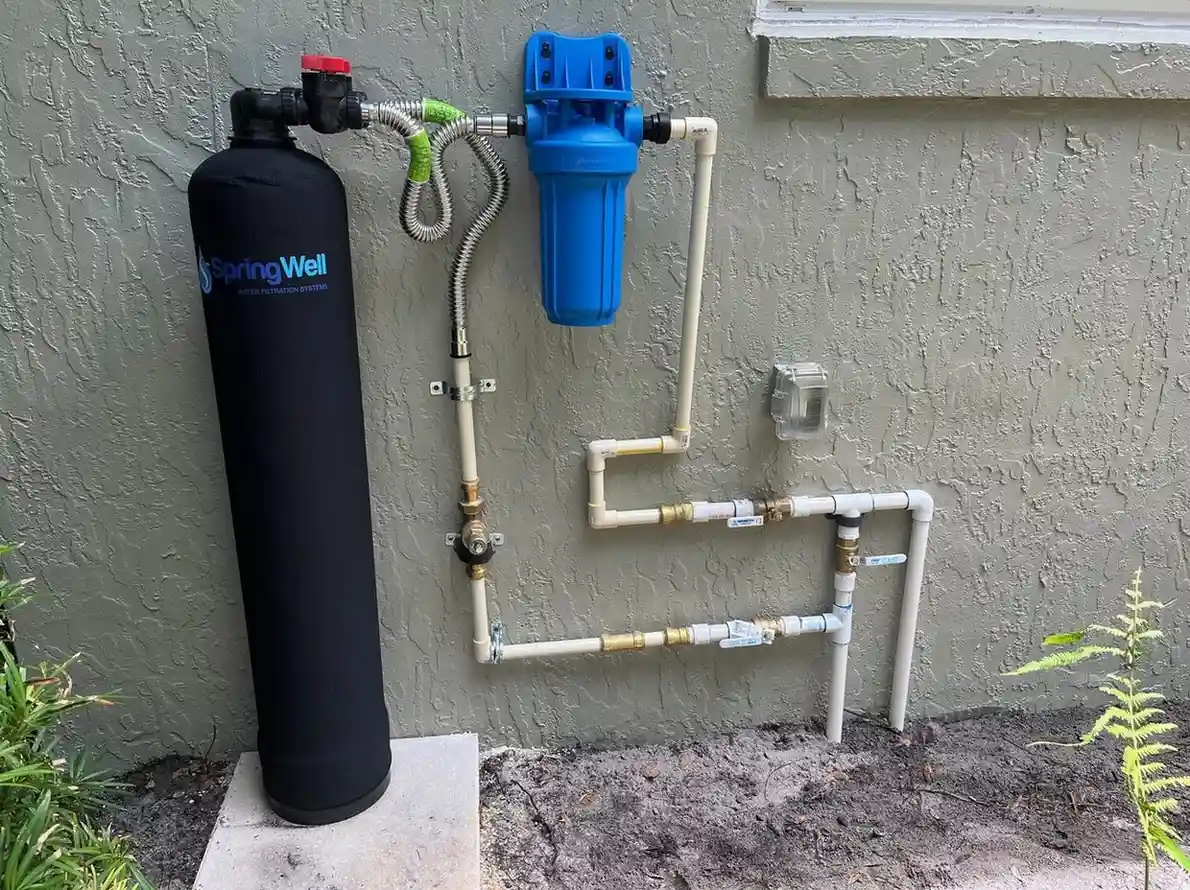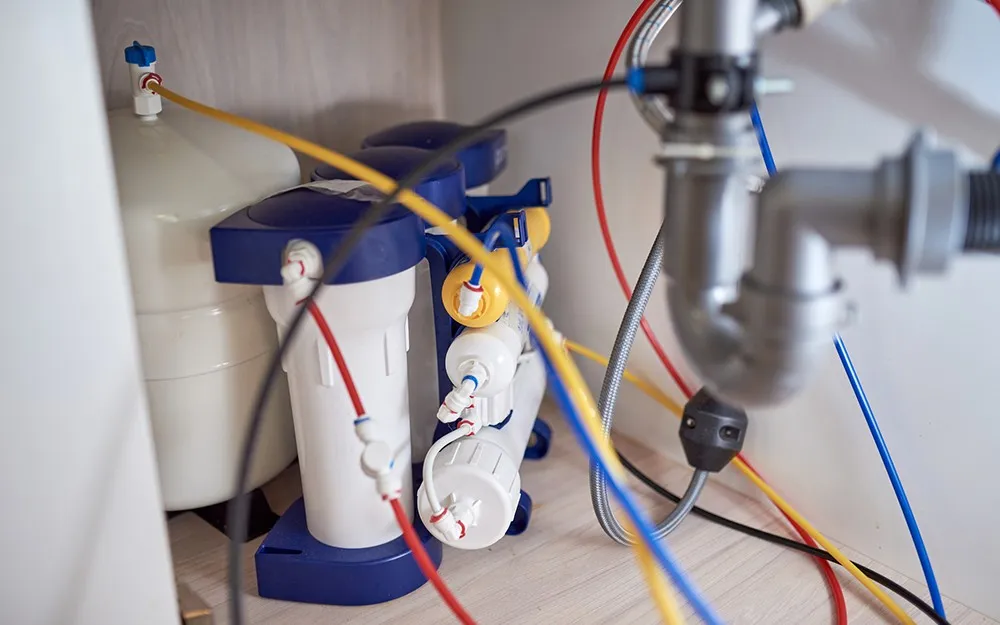Whole Home Water Filtration in Agoura Hills, CA
Serving Ventura & Sacramento Counties

Whole Home Water Filtration Agoura Hills, CA
Clean, reliable water matters for every part of your home. A whole-home water filtration system in Agoura Hills, CA protects plumbing, appliances, fixtures, and your family from common local water issues like chlorine taste and odor, seasonal sediment from runoff, and mineral buildup that accelerates wear. This page explains why filtering all incoming water is often the best long-term choice for Agoura Hills homes, the system types and media available, how installation ties into your plumbing, what improvements to expect, and practical maintenance and testing guidance to keep performance consistent.
Why whole-home filtration matters in Agoura Hills
Agoura Hills sits in a Mediterranean climate with warm, dry summers and occasional heavy winter rains that can introduce sediment and organics into water supplies. Municipal treatment commonly uses chlorine, which controls bacteria but leaves taste and odor and can contribute to dry skin and faded clothing. Hard water minerals and trace metals cause scale on fixtures, reduce heater efficiency, and shorten the life of dishwashers and washing machines.
A properly sized whole-home filtration system treats every water outlet - showers, faucets, laundry, irrigation - so you get consistent quality and protect plumbing and appliances upstream of any point-of-use filters.
Common whole-home water filtration issues in Agoura Hills homes
- Chlorine taste and smell in drinking and cooking water
- Hard water scale on faucets, showerheads, and inside water heaters
- Brown or cloudy water after heavy rains due to sediment or organic particles
- Discolored laundry and dull fabrics from mineral staining
- Reduced appliance lifespan and efficiency from mineral and particulate buildup
- Concerns about lead, iron, or trace contaminants in older plumbing
Understanding the specific combination of issues in your home determines the right system design and media selection.

Whole-home system types and filter media
- Sediment filters
- Purpose: Remove sand, silt, and rust particles to prevent clogging and abrasive wear.
- Typical use: Pre-filter stage to protect finer media and equipment.
- Activated carbon (block or granular)
- Purpose: Remove chlorine, chloramines, VOCs, and improve taste and odor.
- Typical use: Primary treatment for municipal chemical treatment byproducts.
- KDF (copper-zinc) media
- Purpose: Reduce chlorine, heavy metals, and inhibit bacterial growth on carbon.
- Typical use: Paired with carbon for longer media life and improved heavy metal reduction.
- Catalytic carbon
- Purpose: Effective at removing chloramines and certain industrial contaminants.
- Typical use: When municipal systems use chloramines instead of free chlorine.
- Water softening (ion exchange)
- Purpose: Reduce hardness minerals (calcium and magnesium) that cause scale.
- Typical use: Protect water heaters, plumbing, and appliances; note that softeners do not remove chlorine or particulates.
- UV disinfection
- Purpose: Inactivate bacteria and viruses; used when biological contamination risk exists.
- Typical use: Well water or after filtration where microbial concerns are present.
- Specialized media (iron, manganese, arsenic)
- Purpose: Targeted removal where testing shows elevated levels.
- Typical use: Older homes or properties on private sources.
- Point-of-use reverse osmosis
- Purpose: Provide ultrapure drinking and cooking water.
- Typical use: Under-sink RO complements whole-home systems rather than replacing them.
Sizing, flow rates, and where systems are installed
Whole-home systems are installed at the main water entry point - typically in a garage, utility room, or near the meter. Key considerations:
- Flow rate and peak demand: Systems must handle simultaneous usage (showers, washer, dishwasher). Residential sizing often targets 8 to 15 gallons per minute (GPM) depending on household size.
- Pressure considerations: Filtration can reduce pressure as media loads; properly sized units and staged filtration maintain strong water pressure.
- Bypass and isolation valves: Install a bypass loop and shutoff valves to allow servicing without interrupting the whole house water.
- Space and accessibility: Units need enough clearance for media changes and service. Pre-filters should be easy to access.
- Plumbing integration: Installations include shutoffs, pressure regulators if needed, backflow prevention when required by local code, and permits when applicable.
A staged system - sediment first, then carbon/KDF, followed by optional softening or UV - gives balanced protection and peak performance.
Expected improvements after installation
- Noticeably improved taste and reduced chlorine odor at every tap
- Softer-feeling skin and hair when chlorine and chloramines are removed
- Reduced scale on fixtures and inside water heaters leading to extended appliance life and improved energy efficiency
- Cleaner laundry and less soap/scum buildup on surfaces
- Fewer maintenance calls for clogged fixtures, sediment in irrigation lines, and premature appliance failures
- Consistent water clarity after storms when sediment is filtered at the entry point
Many homeowners also notice reduced detergent and soap usage because the water allows cleaners to rinse more effectively.
Diagnostic, installation process, and what to expect during service
- Water testing first: A comprehensive test checks hardness, chlorine, TDS, iron, manganese, pH, and any site-specific contaminants. Testing guides media selection.
- System design: Based on flow and test results, technicians recommend media types, vessel sizes, and staging.
- Site preparation: Locate the main shutoff and plan the installation area with consideration for drainage, electrical needs for UV or electronic softeners, and permit requirements.
- Installation steps:
- Isolate main and drain down as needed
- Install sediment pre-filter and main filter vessels with bypass valves
- Connect softeners or UV systems and set up electrical per code
- Flush and commission the system; retest water to confirm performance
- Documentation: Service records include media types, start dates, and recommended maintenance intervals.
Expect a full-day installation in most single-family homes; timing varies based on complexity and additional plumbing work.
Ongoing maintenance and testing guidance
- Replace pre-filters on a regular schedule - commonly every 3 to 12 months depending on sediment load and filter type.
- Carbon and specialty media typically require replacement every 2 to 5 years depending on water quality and usage.
- Water softener resin lasts many years but requires periodic salt checks and occasional resin replacement in high-iron situations.
- UV lamps should be replaced annually and quartz sleeves cleaned to maintain disinfection performance.
- Monitor pressure drop across the system; a rising drop indicates filter loading and the time for servicing.
- Annual water testing: Re-check key parameters (hardness, chlorine, TDS, bacteria if applicable) to make sure the system continues to meet expectations and to adjust media choices over time.
- Keep a maintenance log showing filter changes, test results, and any service performed.
Regular maintenance preserves water quality, sustains warranty coverage, and maximizes lifespan of both filtration equipment and household plumbing.
Final considerations for Agoura Hills homes
Whole-home water filtration in Agoura Hills is an investment in health, comfort, and the long-term reliability of your plumbing and appliances. Because local conditions can vary from one neighborhood to another, start with an accurate water test and a system design that balances filtration, softening, and flow requirements. Proper installation, staged filtration, and a predictable maintenance plan deliver consistent water quality throughout your home while protecting your property against the common regional problems of chlorine, sediment, and mineral buildup.
Upgrade to Whole Home Water Filtration in Agoura Hills
From chlorine taste to mineral buildup, Agoura Hills homes face unique water challenges that affect everything from showers to laundry to appliance life. A whole-home water filtration system ensures every faucet delivers clean, great-tasting water while protecting plumbing, fixtures, and major appliances from scale and sediment damage.
Our systems are custom-designed for local conditions—whether that means sediment and carbon filtration, chloramine removal with catalytic carbon, or pairing filtration with water softening or UV disinfection. Installations include proper sizing for peak household demand, code-compliant plumbing integration, and bypass valves for easy servicing.
Enjoy cleaner, healthier water in every room. Schedule your Whole Home Water Filtration installation in Agoura Hills, CA with AirWorks Solutions today and protect your home with reliable water quality for years to come.


